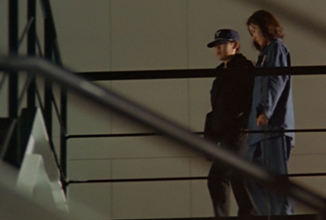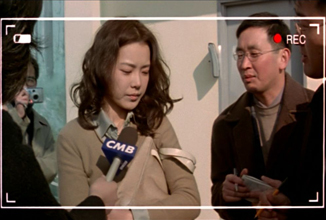"We had a dream. Let's wake up from it and return to where we belong:
You go back to your life, and I go back to being a slut who got divorced from her husband." - dialogue spoken by Moon-hee.
Synopsis:
Moon-hee (Suh Jung) - a 32 year-old, recently divorced woman - is arrested for having sex with a young male, Hyun (Shim Ji-ho), who is in his final year of high school and legally still a minor. After being sentenced to one hundred hours of community service, she is released to find both a hoard of journalists clamoring for a statement from her, and Hyun waiting to drive her to safety - away from those journalists' prying eyes.
Moon-hee and Hyun, however, don't travel too far before they invariably end up in a motel, where they spend the next few days indulging in continual, and almost endless, sex.
When they finally emerge into the daylight, Moon-hee uses the excuse that their large age difference will eventually cause them to split up, to dump Hyun and walk off into the distance, but Hyun has no intention of allowing Moon-hee to cast him aside so easily...
Review:
Though Green Chair is, as the above synopsis implies, a story of sex and love both within and outside of the constraints of the morals and laws laid down by society, it is, at the same time, a great deal more and from the earliest stages of the film the extreme sexual explicitness presented heralds a movie the likes of which viewers are unlikely to have seen before, certainly in Korean cinema.
Green Chair could almost be considered as three separate films (forming distinct sections within it) perfectly melded together - each reinforcing and complimenting the others - with the resultant overall feel, and the success of the discussion of the themes present, noticeably stronger as a result of their combination:
The first of these "sections" deals with the introduction of the characters of Moon-hee and Hyun - setting up the basic premise of their relationship - and even this early in proceedings, details the increasing effect which society's opinions have on both characters. Moon-hee's growing paranoia that she is being both judged and watched adds fuel to her fears that Hyun will eventually leave her for a younger woman, playing a large part in her decision to repeatedly try to end the relationship even though she is, in her heart, desperate to stay with her young lover.
The question is also raised (the first time of several) as to whether Moon-hee and Hyun's affair is really based on love, or if they are in fact involved with each other for rather more selfish reasons.
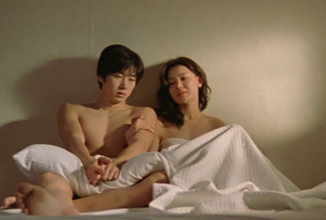 |
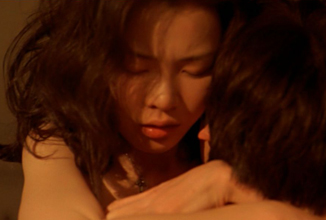 |
As the second section takes centre stage, Moon-hee goes to stay with a close friend, Jean (Oh Yun-hong), - followed quickly by Hyun - and it quickly becomes obvious that even though Moon-hee is an intelligent, confident woman, a part of her wishes that Hyun would just tell her what to do ("If you'd wanted me to stay, you should have locked me in the car"), which speaks volumes to her indoctrination (by society) into the traditional role expected of many married women in South Korea, certainly until very recently.
This section of the film is also interspersed with scenes of Moon-hee looking after two elderly ladies with dementia, as part of her community service, and though this initially seems separate from everything else that we have thus far seen, the hypocrisy of society's morals and opinions - which criticises some actions, while condoning others which are, in reality, far more questionable - is brought firmly and repeatedly into the harsh light of day.
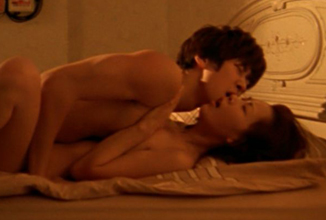 |
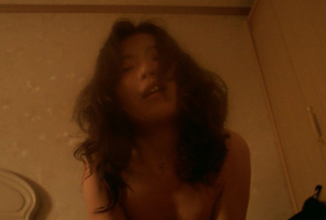 |
The third section is by far the shortest of the three, but perfectly wraps up proceedings in a wonderfully strange way:
It consists of a dinner party which takes place at Jean's home - with Moon-hee, Hyun, Jean, Hyun and Moon-hee's parents, Moon-hee's ex-husband, the policeman who arrested Moon-hee, a (previously unseen) girl who is in love with Hyun, and even one of the old ladies with dementia.
So as not to spoil the outcome of events, I will only say that a set of "interviews" gradually reveal the truth behind the outrage expressed at Moon-hee and Hyun's relationship, and the moral stand-point of those around the main characters, and the twisted rationale that undermines those ideals and beliefs is also clearly shown to stand for the blinkered, selfish reasoning behind society's attitudes as a whole.
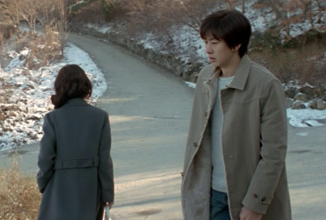 |
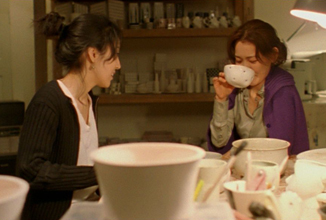 |
There is no doubt that a story such as this could easily become bogged down with the seriousness of the themes presented, but thankfully director Park Chul-soo repeatedly peppers the plot with genuinely funny moments - each played in an understated, almost passing, way - which not only lighten proceedings, but also increase viewer empathy for each of the main characters.
Several plot elements also later turn out to have been nothing more than imaginings in certain characters' minds, once again reinforcing the themes present while adding to the eventual realisation that each character's beliefs are subconsciously based as much around their own needs and desires as they are on moral rights and wrongs.
Park Chul-soo also goes to great lengths to ensure that virtually every scene involving Moon-hee and Hyun plays with our two lovers almost filling the frame, with other characters existing in a much smaller space - mirroring the fact that when Moon-hee and Hyun are together the rest of the world virtually disappears.
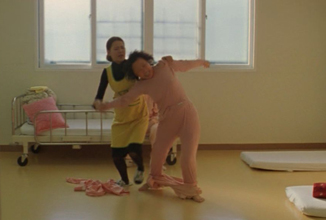 |
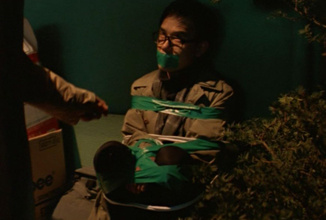 |
Cast:
Suh Jung (as Moon-hee) gives a superb performance in her role as a woman whose heart and head are regularly at odds with each other, as well as at odds with society's ideas of right and wrong, and it is largely thanks to the sensuality of her portrayal that audiences will view the explicitness on show as an integral, and necessary, part of proceedings within the film, rather than nudity for nudity's sake.
Shim Ji-ho (as Hyun) is a relative newcomer to Korean cinema, but his accomplished performance easily belies his inexperience.
Both actors have a noticeable chemistry throughout and, as a result, the believability of the relationship between a man, who is still partly a boy, and an older woman is never brought into question.
Note should also be made of Oh Yun-hong's role as Moon-hee's friend Jean - though very much a secondary role to the two main characters, she nonetheless gives a nuanced, and memorable, performance.
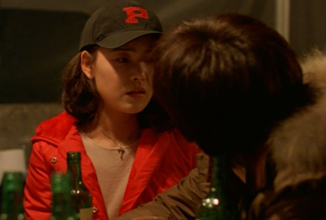 |
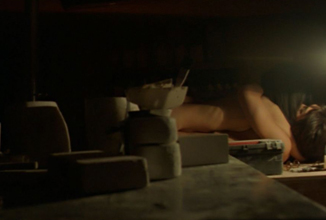 |
Summary:
Tackling the taboo subject of a love affair frowned upon by society, Green Chair exquisitely, and explicitly, gives an insight into the minds and opinions of those both inside and outside the risqué relationship.
DVD:
The DVD
edition reviewed here is the Korean (Region 3) 2-Disc Special Edition Release
from Starmax Entertainment, which comes complete with deluxe packaging.
The film is
provided as an anamorphic transfer with an aspect ratio of 1.85:1. There are no image artifacts and no ghosting present, and the
picture remains consistently sharp throughout.
The original Korean
language soundtrack is provided as Dolby Digital 5.1 or Dolby 2.0, and is bright and clear.
Excellent subtitles are provided for the main feature, but English speaking viewers should be aware that there are no English subtitles available for any of the DVD extras.
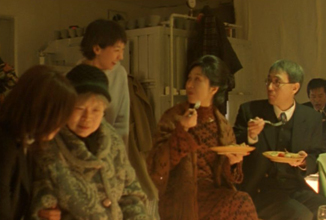 |
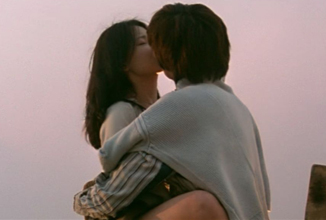 |
DVD Details:
Actors: Suh Jung, Shim Ji-ho, Oh Yun-hong
Directors: Park Chul-soo
Format: NTSC, Widescreen
Language: Korean
Subtitles: English, Korean, None
Region: Region 3
Number of discs: 2
Classification: Category 3 (18)
Distributor: Starmax Entertainment
Run Time: 98 minutes
DVD Extras:
Making Of Featurette
Theatrical & Teaser trailers
|


